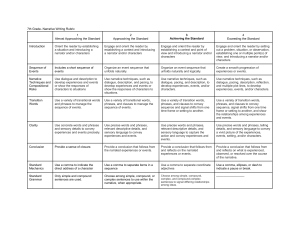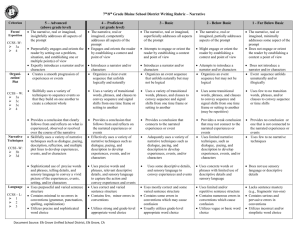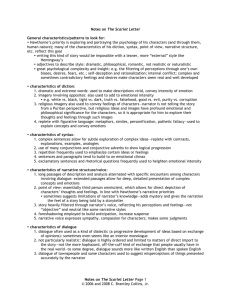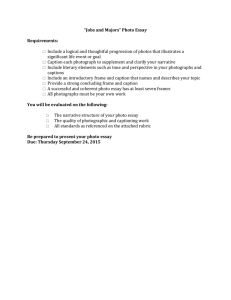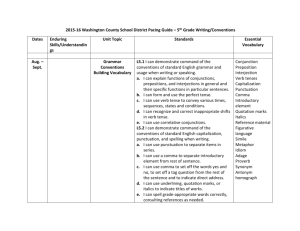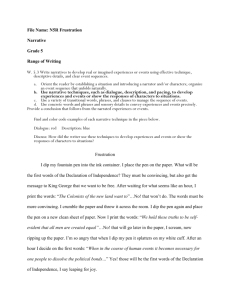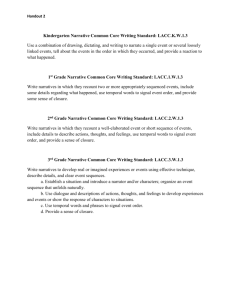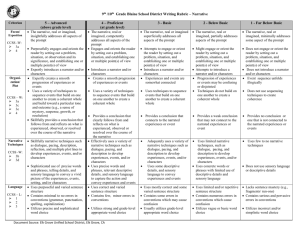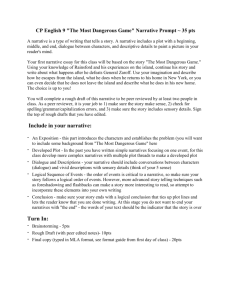7-8 Grade Narrative Writing Rubric: Bentonville Schools
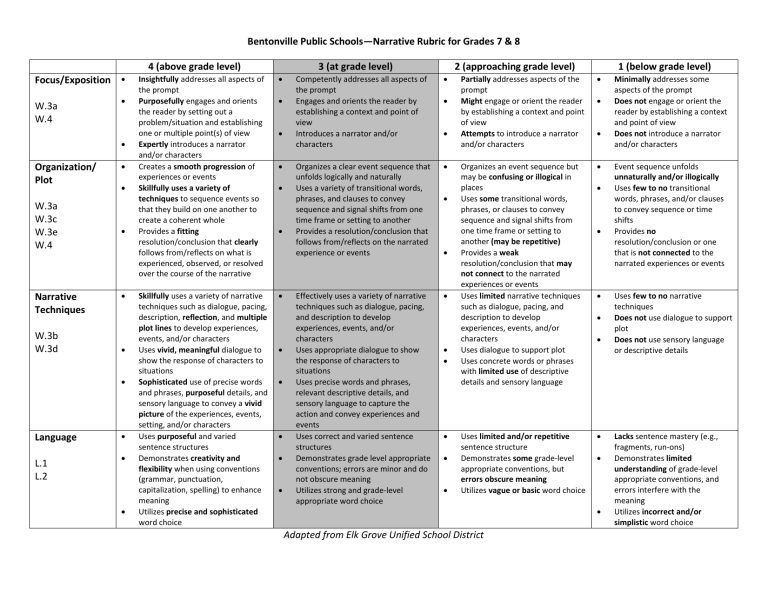
Bentonville Public Schools—Narrative Rubric for Grades 7 & 8
Focus/Exposition
W.3a
W.4
Organization/
Plot
W.3a
W.3c
W.3e
W.4
Narrative
Techniques
W.3b
W.3d
Language
L.1
L.2
4 (above grade level)
Insightfully addresses all aspects of
the prompt
Purposefully engages and orients the reader by setting out a problem/situation and establishing one or multiple point(s) of view
Expertly introduces a narrator and/or characters
Creates a smooth progression of experiences or events
Skillfully uses a variety of
techniques to sequence events so that they build on one another to create a coherent whole
Provides a fitting resolution/conclusion that clearly follows from/reflects on what is experienced, observed, or resolved over the course of the narrative
3 (at grade level)
Competently addresses all aspects of
the prompt
Engages and orients the reader by establishing a context and point of view
Introduces a narrator and/or characters
Organizes a clear event sequence that unfolds logically and naturally
Uses a variety of transitional words, phrases, and clauses to convey sequence and signal shifts from one time frame or setting to another
Provides a resolution/conclusion that follows from/reflects on the narrated experience or events
2 (approaching grade level)
Partially addresses aspects of the
prompt
Might engage or orient the reader by establishing a context and point of view
Attempts to introduce a narrator and/or characters
Skillfully uses a variety of narrative techniques such as dialogue, pacing, description, reflection, and multiple
plot lines to develop experiences, events, and/or characters
Uses vivid, meaningful dialogue to show the response of characters to situations
Sophisticated use of precise words and phrases, purposeful details, and sensory language to convey a vivid
picture of the experiences, events, setting, and/or characters
Uses purposeful and varied sentence structures
Demonstrates creativity and
flexibility when using conventions
(grammar, punctuation, capitalization, spelling) to enhance meaning
Utilizes precise and sophisticated word choice
Effectively uses a variety of narrative techniques such as dialogue, pacing, and description to develop experiences, events, and/or characters
Uses appropriate dialogue to show the response of characters to situations
Uses precise words and phrases, relevant descriptive details, and sensory language to capture the action and convey experiences and events
Uses correct and varied sentence structures
Demonstrates grade level appropriate conventions; errors are minor and do not obscure meaning
Utilizes strong and grade-level appropriate word choice
Adapted from Elk Grove Unified School District
Organizes an event sequence but may be confusing or illogical in places
Uses some transitional words, phrases, or clauses to convey sequence and signal shifts from one time frame or setting to another (may be repetitive)
Provides a weak resolution/conclusion that may
not connect to the narrated experiences or events
Uses limited narrative techniques such as dialogue, pacing, and description to develop experiences, events, and/or characters
Uses dialogue to support plot
Uses concrete words or phrases with limited use of descriptive details and sensory language
Uses limited and/or repetitive sentence structure
Demonstrates some grade-level appropriate conventions, but
errors obscure meaning
Utilizes vague or basic word choice
1 (below grade level)
Minimally addresses some
aspects of the prompt
Does not engage or orient the reader by establishing a context and point of view
Does not introduce a narrator and/or characters
Event sequence unfolds
unnaturally and/or illogically
Uses few to no transitional words, phrases, and/or clauses to convey sequence or time shifts
Provides no resolution/conclusion or one that is not connected to the narrated experiences or events
Uses few to no narrative techniques
Does not use dialogue to support plot
Does not use sensory language or descriptive details
Lacks sentence mastery (e.g., fragments, run-ons)
Demonstrates limited
understanding of grade-level appropriate conventions, and errors interfere with the meaning
Utilizes incorrect and/or
simplistic word choice
